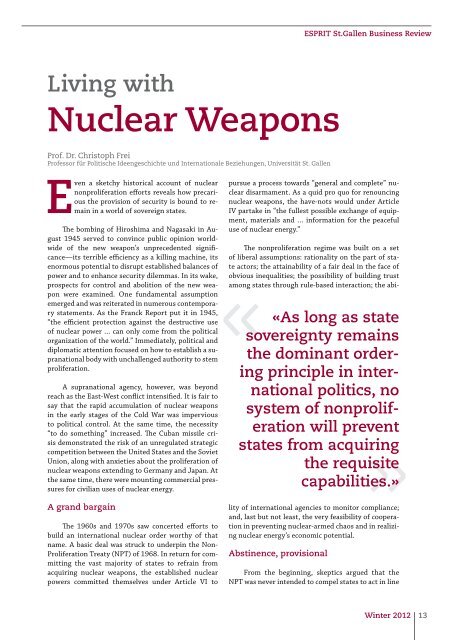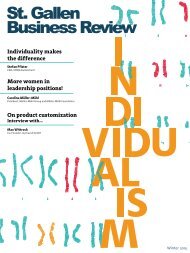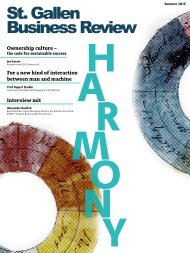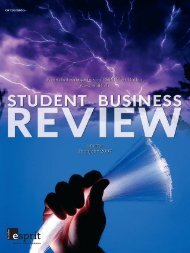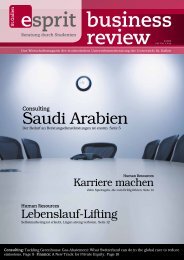Sicherheit und Risiko
St.Gallen Business Review Winter 2012
St.Gallen Business Review
Winter 2012
Erfolgreiche ePaper selbst erstellen
Machen Sie aus Ihren PDF Publikationen ein blätterbares Flipbook mit unserer einzigartigen Google optimierten e-Paper Software.
ESPRIT St.Gallen Business Review<br />
Living with<br />
Nuclear Weapons<br />
Prof. Dr. Christoph Frei<br />
Professor für Politische Ideengeschichte <strong>und</strong> Internationale Beziehungen, Universität St. Gallen<br />
Even a sketchy historical account of nuclear<br />
nonproliferation efforts reveals how precarious<br />
the provision of security is bo<strong>und</strong> to remain<br />
in a world of sovereign states.<br />
The bombing of Hiroshima and Nagasaki in August<br />
1945 served to convince public opinion worldwide<br />
of the new weapon’s unprecedented significance—its<br />
terrible efficiency as a killing machine, its<br />
enormous potential to disrupt established balances of<br />
power and to enhance security dilemmas. In its wake,<br />
prospects for control and abolition of the new weapon<br />
were examined. One f<strong>und</strong>amental assumption<br />
emerged and was reiterated in numerous contemporary<br />
statements. As the Franck Report put it in 1945,<br />
“the efficient protection against the destructive use<br />
of nuclear power … can only come from the political<br />
organization of the world.” Immediately, political and<br />
diplomatic attention focused on how to establish a supranational<br />
body with unchallenged authority to stem<br />
proliferation.<br />
A supranational agency, however, was beyond<br />
reach as the East-West conflict intensified. It is fair to<br />
say that the rapid accumulation of nuclear weapons<br />
in the early stages of the Cold War was impervious<br />
to political control. At the same time, the necessity<br />
“to do something” increased. The Cuban missile crisis<br />
demonstrated the risk of an unregulated strategic<br />
competition between the United States and the Soviet<br />
Union, along with anxieties about the proliferation of<br />
nuclear weapons extending to Germany and Japan. At<br />
the same time, there were mounting commercial pressures<br />
for civilian uses of nuclear energy.<br />
A grand bargain<br />
The 1960s and 1970s saw concerted efforts to<br />
build an international nuclear order worthy of that<br />
name. A basic deal was struck to <strong>und</strong>erpin the Non-<br />
Proliferation Treaty (NPT) of 1968. In return for committing<br />
the vast majority of states to refrain from<br />
acquiring nuclear weapons, the established nuclear<br />
powers committed themselves <strong>und</strong>er Article VI to<br />
pursue a process towards “general and complete” nuclear<br />
disarmament. As a quid pro quo for renouncing<br />
nuclear weapons, the have-nots would <strong>und</strong>er Article<br />
IV partake in “the fullest possible exchange of equipment,<br />
materials and … information for the peaceful<br />
use of nuclear energy.”<br />
«As long as state<br />
sovereignty remains<br />
the dominant ordering<br />
principle in international<br />
politics, no<br />
system of nonproliferation<br />
will prevent<br />
states from acquiring<br />
the requisite<br />
capabilities.»<br />
The nonproliferation regime was built on a set<br />
of liberal assumptions: rationality on the part of state<br />
actors; the attainability of a fair deal in the face of<br />
obvious inequalities; the possibility of building trust<br />
among states through rule-based interaction; the ability<br />
of international agencies to monitor compliance;<br />
and, last but not least, the very feasibility of cooperation<br />
in preventing nuclear-armed chaos and in realizing<br />
nuclear energy’s economic potential.<br />
Abstinence, provisional<br />
From the beginning, skeptics argued that the<br />
NPT was never intended to compel states to act in line<br />
Winter 2012 13


